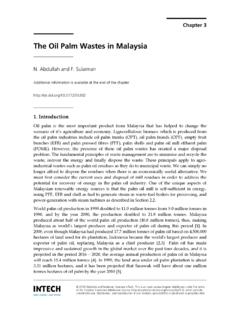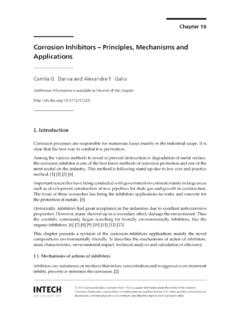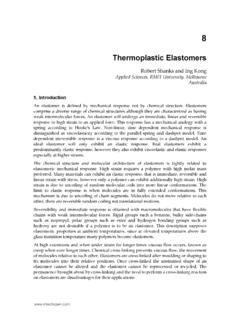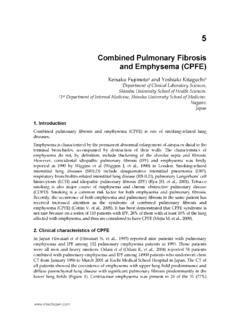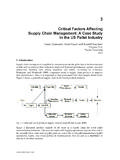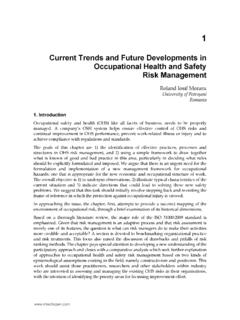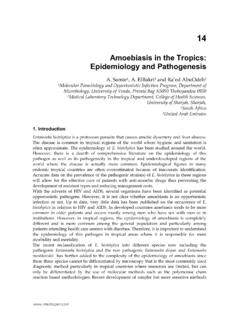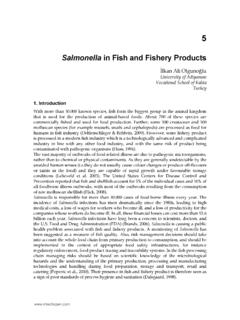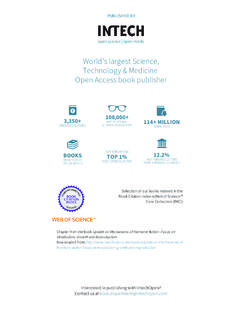Transcription of Developing Emotional Intelligence for Healthcare Leaders
1 13 Developing Emotional Intelligence for Healthcare Leaders Claudia S. P. Fernandez1, Herbert B. Peterson1, Shelly W. Holmstr m2 and AnnaMarie Connolly1 1 The University of North Carolina at Chapel Hill 2 The University of South Florida USA 1. Introduction Skills in Emotional Intelligence (EI) help Healthcare Leaders understand, engage and motivate their team. They are essential for dealing well with conflict and creating workable solutions to complex problems. EI skills are grounded in personal competence, upon which build the skills for social competence, including social awareness and relationship management. The leader s EI skills strongly impact the culture of the organization.
2 This article lists example strategies for building seventeen key Emotional Intelligence skills that are the foundations for personal and work success and provides examples of their appropriate use as well as their destructive under-use and over-use. Many examples are those incorporated into our Healthcare -related leadership development institutes offered at the University of North Carolina s Gillings School of Global Public Health. 2. EI and EQ in Healthcare Leaders More than prescriptions, medicine involves communication, tolerance, flexibility, listening, hard work and a passion for the practice. --Floyd Loop, MD (Loop 2009) In the world of Healthcare , as with many other sectors, equating Intelligence with leadership can be a significant error.
3 While Intelligence is a critical building block of success for Healthcare Leaders , and for physicians in particular, to rely upon sheer Intelligence to manage the complexities inherent in modern Healthcare is tantamount to inviting career derailment. Healthcare as a field is cast against a background of patient and family anxiety, often challenging diagnosis and treatment, and financial as well as regulatory complexity. Intellect is helpful, but is only one of many keys to success for Healthcare Leaders . In considering challenging work situations encountered by physicians, nurses and other Healthcare Leaders with colleagues or staff, many center on: 1) misunderstandings of either word or intent; 2) the inability of an individual to grasp the impact of their actions on others; or 3) the grit-in-the-gears hurdles created by organizational culture issues.
4 While Healthcare Leaders face clinical and financial challenges, interpersonal issues frequently Emotional Intelligence New Perspectives and Applications 240 prove the most time- and resource-consuming (Pfifferling 2008, Freshman & Rubino 2002, Gifford, et al 2002, Cummings 2009). Tools required for Healthcare Leaders to succeed generally fall into two categories: hard and soft (Klaus 2008). For physicians in particular, but also for many other Healthcare Leaders , hard skills are the technical skills traditionally emphasized in training. Medical schools and residency programs, as well as advanced nursing and allied health training programs, and public health focus on clinical fund-of-knowledge and clinical skill acquisition.
5 For Healthcare administrators these hard skills typically fall under financial, systems, and facilities management. Development of these skills requires an intellectual capacity to absorb, process, and integrate knowledge which, at times, is referred to as the Intelligence quotient or IQ . The soft skills are more nuanced and include interpersonal and communication skills and professionalism (Porath & Pearson 2009, O Toole & Bennis 2009, Awad 2004) which, until recently, have received far less attention in formal training for either medicine (Awad 2004, Horwitz 2008, Mrkonjic & Grondin 2011, Wagner 2002), nursing (Cummings 2009), or Healthcare administration (____ 2011). These skills are strategic in nature, and as such, cross disciplines rather than being the province of any single profession.
6 Differentiated from IQ, these skills rely much more on Emotional Intelligence , sometimes referred to as EI, or Emotional quotient (EQ). Emotional Intelligence as a differentiated construct is made up of the personal- Emotional -social components of general Intelligence (Bar-On 1997, Bar-On 2002, Pearman 2003). Thus, EI generally refers to a broad range of competencies, often addressed from a theory standpoint. By contrast, EQ generally refers to a quantification of skills in practice, and in particular to measures of Emotional Intelligence captured by commonly used psychological assessment instruments (Ackley 2006, Bar-On 1997, Bar-On 2002, Mayer et al 2002, Pearman 2003, Stein 2011).
7 In practice, and axiomatically, Leaders can only get things done by working with and through others. While the most senior clinical Leaders in Healthcare may be marginally involved in the actual clinical setting, most Healthcare Leaders coordinate or oversee the direct-care efforts of their teams or organizations. At all levels, Leaders set the EI culture in their enterprise and this culture directly impacts patient relationships (Levinson 2002, Mrkonjic & Grondin 2011, Wagner 2002), staff morale (Freshman & Rubino 2002), turnover (Gifford, et al 2002, Hill 2002), and relationships with colleagues (Freshman & Rubino 2002, Porath & Pearson, O Toole & Bennis 2009, Cummings 2009, Awad 2004, Mrkonjic & Grondin 2011).
8 When development of the EI of the culture is ignored in favor of a view that intellect rules , organizations make themselves susceptible to disruptive behavior from incivility to outright hostility (Porath & Pearson 2009, Loop 2009, Lewis 2010). This disruptive behavior often provides examples of poor application of Emotional Intelligence skills, which can cause direct organizational harm. For example, when Leaders fail to deal directly with disruptive physician behavior, it negatively impacts medical quality, safety, team work, creativity, and commitment (Porath & Pearson 2009, Pfifferling 2008). Consequently organizations expend an inordinate amount of effort and resources in stopping, neutralizing, or correcting disruptive behavior, (Pfifferling 2008, Loop 2009).
9 An overt disruptive behavior and those cultures failing to embrace and implement Emotional Intelligence directly cause significant detrimental effects to the bottom line of an enterprise (Porath & Pearson 2009, Pfifferling 2008). Creating leadership environments that are Developing Emotional Intelligence for Healthcare Leaders 241 relational (task focused) has been related to poorer Emotional health and Emotional exhaustion in nurses, while creating those that are founded upon EI-associated relational leadership has been found by many studies to enhance nurse satisfaction, recruitment, and retention (Cummings 2009). Poor application of EI in Healthcare settings specifically will harm the organization s reputation, its patient care, and increase staff turnover, all of which can impact financial health (Porath & Pearson 2009, Pfifferling 2008).
10 Recent work from the Center for Creative Leadership (CCL; Greensboro, NC) reports that the Healthcare sector s top priority for leadership development is improving the ability to lead employees and work in teams (CCL 2010). However, this skill, along with self-awareness, was rated lowest of skills actually demonstrated by Healthcare Leaders (CCL 2010). Other recent CCL research indicates that the interpersonal soft-skills are rising in importance among Leaders , with participative management, building and mending relationships, and change management replacing former top-rated skills such as resourcefulness, decisiveness, and doing whatever it takes (Martin 2005).
